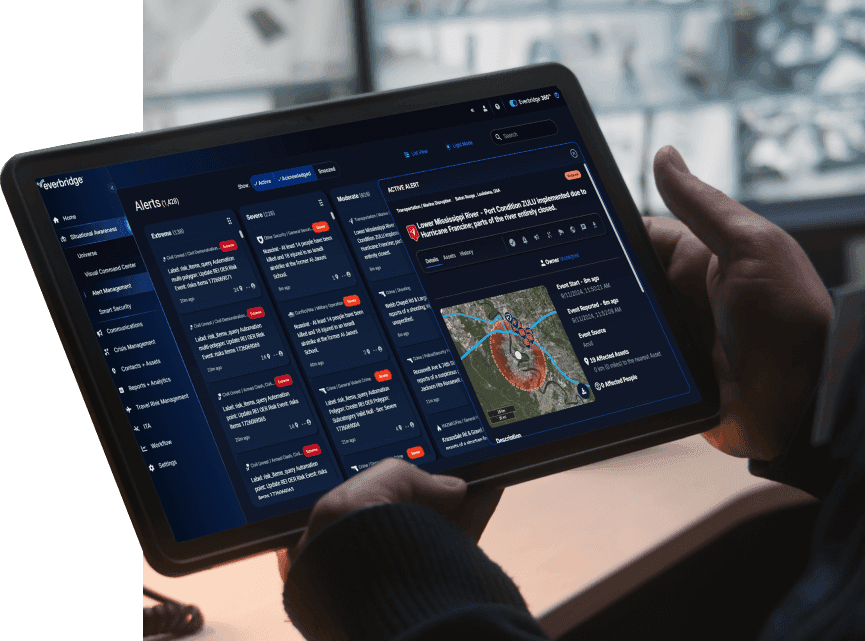Some critical events may be familiar to organizations, they may happen repeatedly or even on a set schedule. Others may present new challenges that responders haven’t seen or experienced before. In a worst-case scenario, events could even happen concurrently, forcing responders to split their attention while trying to anticipate and account for the combined effects. Regardless, all critical events require steadfast leadership to minimize the impact on an organization’s people and operations.
Much of the discussion on an organization’s state of readiness for critical events focuses on the capabilities and planning of the enterprise. Even the best emergency response plan, however, stands little chance of being successful if the members of the leadership team orchestrating the company’s response are ill-equipped to manage a coordinated response.
Let’s take a closer look at the essential crisis management skills leaders must possess and draw upon when a crisis occurs to better prepare for critical events long before they occur.
Understanding the three types of critical events
There are three categories of critical events that organizations experience and need to be able to manage.
- Routine emergencies, like natural disasters, are events that we’ve seen before and can plan for based on past experience.
- Crisis emergencies are novel events, like terrorist attacks, that are nearly impossible to be aware of ahead of time, so prior planning is uncommon.
- Emergent crises that initially present as routine emergencies, giving responders a false sense of security in thinking that they’ve experienced this kind of critical event previously, when in reality they haven’t (the recent global pandemic, for example).
Given that the scope, severity, and novelty of critical events will in part dictate how useful an organization’s emergency response plans are, it’s important to consider the two components of organizational preparedness that come into play when facing critical events: operating in a constant state of readiness and having a wide range of contingency plans in place. Emergency response planning is crucial, but even the most robust plan can’t cover all situations. All critical events involve real-time decision-making and action in the face of tremendous pressure.
Contrary to common belief, organizations do not prepare for all potential critical events. Worst-case scenarios are too broad, too severe, and too unpredictable to make it practical or cost-effective to incorporate these scenarios in an emergency response plan or training. Instead, emergency response plans are crafted to address routine emergencies — those that are reasonably predictable and that organizations already understand how to manage.
How then, can organizations be prepared for emergencies and critical events? This is where the leadership skills of emergency managers come into play.
Seven effective crisis management skills to master
According to Regina Phelps, noted expert in the field of emergency management and continuity planning, there are seven essential skills members of an organization’s leadership team must possess and develop in order to navigate critical events effectively, protect their people, and maintain business continuity:
- Situational awareness
- Improvisation
- Creativity & adaptability
- Decisiveness
- Action
- Communication
- Reevaluation
In an Everbridge webinar, Ms. Phelps highlighted the importance of each skill and illustrated how the interplay among them can help leaders minimize the impact of critical events on their organizations. The following is a brief overview of the main points Ms. Phelps covered.
Situational awareness
The first skill is situational awareness, which speaks to the leadership team’s ability to consider the broader context surrounding a critical event while it is unfolding, assess the relevance and completeness of available information, anticipate the likely consequences, and make appropriate decisions. When a leadership team is unable to sort out crucial information from irrelevant data or comprehend the implications of certain response measures, they are unlikely to be able to minimize the impact of the crisis.
Improvisation
The next skill leaders must develop is improvisation, the ability to quickly decide to change plans based on the information distilled through situational awareness. In a true crisis emergency, plan A — the one that is tried, tested, and true — probably isn’t going to work. Instead, emergency response leaders will need to turn to plan B. Unfortunately, the more novel an event is, the better the chance is that a plan B doesn’t even exist. Improvisation speaks to the ability of the leadership team to adjust on the fly and synthesize a new plan.
Creativity & adaptability
Improvisation goes hand-in-hand with creativity and adaptability. If we think of improvisation as the ability to devise a plan B on the fly, with only the conclusions reached through situational awareness, creativity, and adaptability, represent the leadership team’s ability to enact that plan and react appropriately as conditions change. Emergency response is never static. In crisis situations, leaders cannot be married to a single strategy. They need to continue to take in new information, listen carefully, and consult with frontline responders who understand what’s happening. And, as conditions warrant, they must be willing and able to pivot.
Decisiveness
What has up to now been implicit needs to be made explicit, decisiveness is another essential skill. Leaders need to be able to move their organizations forward in the face of confusing, conflicting, and changing information. Because we understand the need for improvisation, creativity, and adaptability, we can understand that decisiveness cannot imply rigidity. It does, however, indicate the importance of being able to choose a course of action quickly, even as situational awareness continues to evolve. If, in the course of the response, it becomes apparent that the wrong decision was made, leaders simply need to reevaluate.
Action
Consider the following tenet of critical event response: You can’t control the disaster, but you can control the response, and this requires assuming the mantle of leadership. Action is a leadership skill that, like decisiveness, almost goes without mention. However, anyone who has experienced a situation where a person in a leadership position has been reluctant to provide leadership understands that action cannot be taken for granted. Leaders must demonstrate an ability to carry out the plans that have been devised to get others to follow their lead.
Communication
The leadership team’s ability to lead is highly dependent upon effective communication. Every organization should have a critical event and emergency communications platform that, in the event of a crisis, enables the emergency response team to:
- Understand where organizational personnel are in relation to the crisis
- Send out automated, contextualized messages to all personnel, including but not limited to those directly in harm’s way
- Receive communication from organizational personnel to understand how they are being affected by the crisis and confirm their safety
That said, the communications platform is the vehicle for sending and receiving messages. The messages require an entirely different consideration. In order to avoid confusion, messages must be clear, crisp, concise, and timely. It’s important that these communications don’t alarm people, but that they also speak to the magnitude of the situation. It is vital that the leadership team makes use of all channels of communication, including social media.
Reevaluation
The last skill that leadership teams need to minimize the impact of critical events is reevaluation. Without a willingness to assess emergency response management by repeatedly asking, “How are we doing?” and “What are we missing?”, all the skills discussed previously are undermined. Without being able to thoughtfully reevaluate, leadership teams run the risk of leading their organizations down a path that will exacerbate rather than minimize the scope and impact of critical events on their organizations.
We invite you to view the webinar to explore these essential leadership skills in detail. And, if you’d like to learn more, we invite you to contact us.

